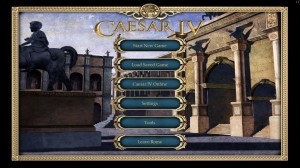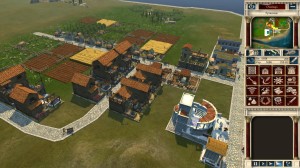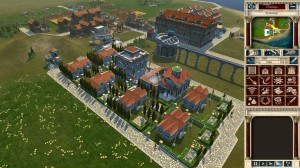“Caesar IV”, through and through, is a city-builder / resource management game (and a difficult one at that). As the governor of a province, you’ll be tasked with building your cities and ensuring that they prosper. To do that, you’ll need to carefully manage the resources scattered around the map, as well as ensure that you have the appropriate workers and buildings to acquire them.
The game was released in 2006, so the options menu may not fully cover everything you’d see today, but it comes close. The single player campaign is broken up into three separate eras (Kingdom, Republic, and Empire) and the missions get harder the farther along you go. There are about five missions per era, though you can choose whether or not you want to take an economical or a military approach to the mission. Your goals for that mission will change appropriately, depending on which one you’ve chosen.
No matter what focus you’ve chosen, you’ll be tasked with raising your city’s attributes above a certain value. These attributes can be accessed in your advisors panel, where you can see the city’s prosperity, culture, population, favour, security, and more. The requirements for beating a level tend to be lower if you choose to go the military route, but you’ll be attacked a lot more often than you would going the economical route. Raising these things can be tricky as the buildings that effect each value aren’t always apparent, which can confuse new players to the game.
There are over one hundred buildable structures and more than thirty different resources available, making the game a fairly decent city-builder. These buildings can range from resource gathering and resource refinement to housing, religion, entertainment, and decorative…just to name a few. Plopping all of these buildings down cost denari (money), and earning that money back can be fairly difficulty to do. The main source of income will be from selling unwanted resources at ports, but you do gain a small bit of money from taxes (assuming you remembered to construct a tax building).
Your citizens are broken up into three classes: plebes, equites, and patricians. Plebes are the easiest to please and make up the backbone of your manual labor. However, their housing tends to bring down your prosperity score. Equites are a bit more picky and have their own housing, doing most of the other jobs that don’t require hard physical work. Patricians are extremely picky and don’t do much besides pay taxes, but you’ll need them if you want your prosperity levels to rise. The higher the class of citizen, the more goods of each type (food, basic, luxury, and exotic) they’ll need in order to be happy.
From time to time, you’ll be tasked with providing Rome with a tribute. This tribute can consist of troops, money, or any type of good. My chief complaint about the game is that unless you have the mission memorized, you won’t know what item Rome will ask for next. If you can’t accommodate Rome by a certain date, your favour will fall. If you fail too many times, you’ll be unable to rise your favour high enough to complete the mission, that is, if Rome hasn’t sent troops to wipe you out. There are only so many scripted tribute requests in a mission, so you’ll need to complete almost every one if you want to succeed. Again, knowing what resources you’ll need to focus on is learned through trial, error, and memorization…which bugs me a bit.
Overall, “Caesar IV” isn’t a bad game and I’ve probably thrown more than a hundred hours at it over the years. The three-dimensional playing field is great, as is the music that plays in the background. The military portions of the game (if you opt to have them) can be frustrating, as the units don’t always respond well to commands. I’d recommend this game to those who are patient and enjoy managing a whole bunch of different resource chains at once. It won’t appeal to those who seek instant gratification, or to those who hate to think when they play games. Those who can get past the learning curve will find it to be a fun and rewarding city-builder.
Final Verdict: 7/10
—
You can watch video play sessions here:
http://www.youtube.com/watch?v=u43msWEUGys
http://www.youtube.com/watch?v=fbxvHOSRu4k
—



